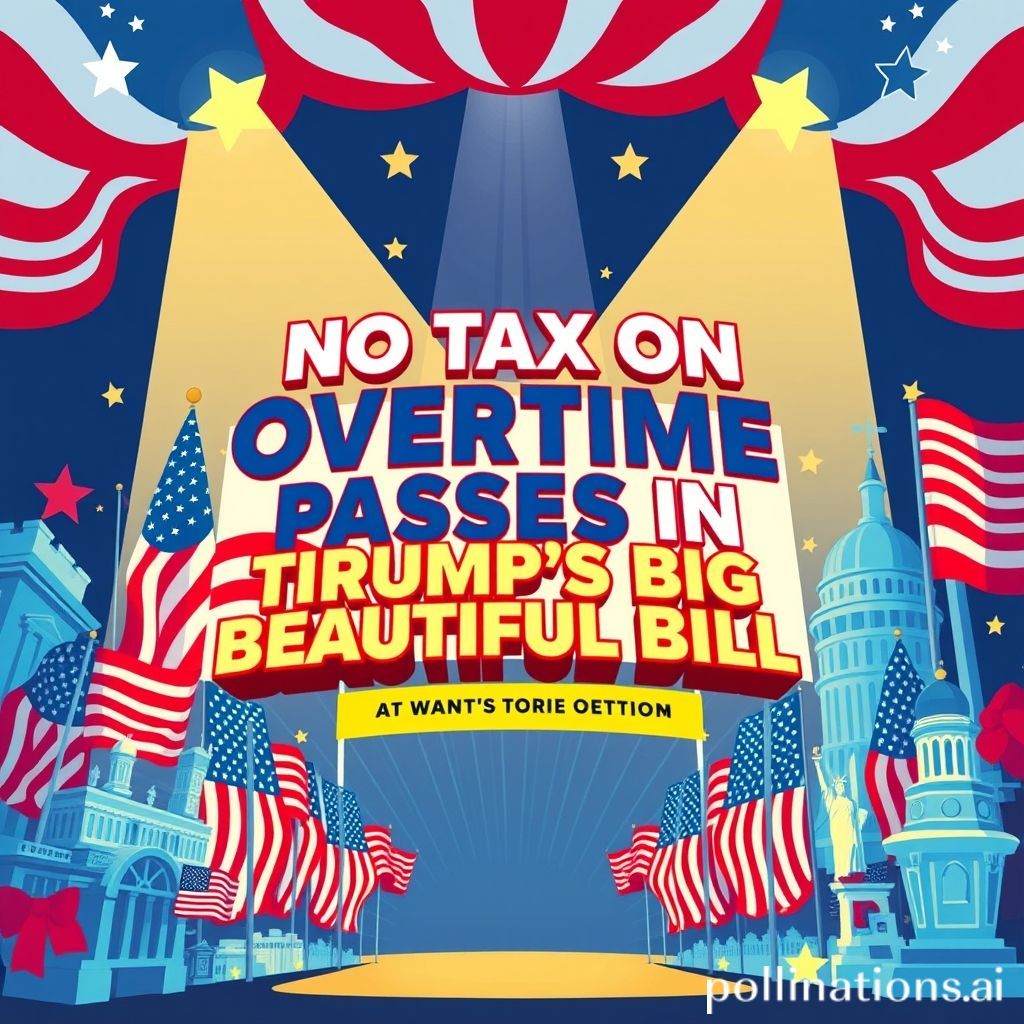No tax on overtime passes in Trump's Big Beautiful Bill: What to know

No tax on overtime passes in Trump's Big Beautiful Bill: What to know
Hey there, fellow taxpayers! Ever wonder how tax laws and big economic reforms really impact your wallet? Today, we are diving deep into a fascinating rumor surrounding Trump s proposed tax reforms, specifically the idea of no tax on overtime passes. Is it fact or fiction? What could it actually mean for you? Let's explore.
Unpacking the Overtime Tax Myth
The concept of eliminating taxes on overtime pay has circulated, especially in discussions around potential tax reforms linked to the Trump administration. The core argument revolves around making overtime work more financially rewarding for employees. The idea is straightforward: if overtime earnings aren't taxed (or are taxed at a significantly lower rate), workers would take home a larger portion of their extra hours.
Potential Benefits and Drawbacks
On the surface, eliminating or reducing overtime taxes sounds like a great deal for workers. More take-home pay translates directly to increased financial flexibility. Families could use that extra income for savings, investments, or simply covering everyday expenses. This kind of boost could be especially beneficial for lower and middle income households that heavily rely on overtime pay.
However, the economic implications are a bit more complex. A complete elimination of overtime taxes could lead to several potential issues:
*Reduced Government Revenue: Taxes on overtime contribute to government revenue. Eliminating them could create a shortfall, potentially requiring cuts in public services or increases in other taxes to compensate.
*Potential for Employer Exploitation: Some fear that employers might be tempted to rely more heavily on overtime hours rather than hiring new employees. This could lead to worker burnout and a decrease in overall job creation.
*Inflationary Pressure: If people have more disposable income without a corresponding increase in goods and services, it could lead to inflationary pressure, decreasing the purchasing power of everyone s earnings, including overtime pay.
Examining the "Big Beautiful Bill" and Overtime
The term "Big Beautiful Bill" was often used by Donald Trump to describe his vision for comprehensive tax reform. While a complete elimination of overtime taxes wasn t explicitly included in the 2017 Tax Cuts and Jobs Act, the act did make significant changes to individual and corporate tax rates. These changes indirectly affect how overtime pay is taxed.
The 2017 Act reduced individual income tax rates, which means that overtime pay, like all other forms of income, is subject to these lower rates. While this isn't the same as eliminating taxes on overtime, it does result in a slightly larger take-home amount compared to previous tax laws.
Understanding the Tax Cuts and Jobs Act (TCJA)
To put things into perspective, let's look at some of the key changes introduced by the TCJA and their potential impact on overtime pay:
Table: TCJA Changes and Overtime Impact
| Feature | Pre TCJA | Post TCJA | Potential Impact on Overtime |
|||||
| Individual Income Tax Rates | Seven brackets, ranging from 10% to 39.6% | Seven brackets, ranging from 10% to 37% | Slightly lower tax burden on overtime earnings due to lower rates |
| Standard Deduction | $6,350 (single), $12,700 (married filing jointly) | $12,000 (single), $24,000 (married filing jointly) | Less taxable income overall, indirectly benefiting overtime earners |
| Corporate Tax Rate | 35% | 21% | No direct impact on individual overtime pay but could influence business decisions on hiring vs. overtime |
The Tax Cuts and Jobs Act did not specifically address overtime tax elimination. While it lowered the income tax rates and increased the standard deduction, both of which indirectly provide some relief to those earning overtime, the main goal was broader economic stimulus rather than targeted overtime pay reform.
The Bottom Line
So, is there "no tax on overtime passes" in Trump's Big Beautiful Bill? The answer is no, not directly. There was no specific provision that eliminated overtime taxes. The Tax Cuts and Jobs Act did lower tax rates, which resulted in slightly more take-home pay from overtime.
Therefore, it's essential to be wary of overly simplistic claims and sensational headlines. Tax policy is intricate and multifaceted. Always consult credible sources and financial professionals for personalized advice.
The Future of Overtime Tax Discussions
The debate over overtime pay and taxation is likely to continue. As economic conditions evolve and discussions surrounding fair wages persist, the idea of targeted tax relief for overtime earnings could resurface. Keep informed, stay engaged, and remember that understanding the nuances of tax laws empowers you to make the best financial decisions for your future.
In Conclusion
Navigating the world of tax policies can feel like traversing a maze. The idea of no tax on overtime is appealing, but it's crucial to understand the underlying economic realities and the specifics of any proposed or enacted legislation. The "Big Beautiful Bill" was more about broader tax reform than specifically targeting overtime pay. As taxpayers, we must remain informed and critical, ensuring that we advocate for policies that truly benefit workers and promote a healthy, equitable economy.
Comments
Post a Comment